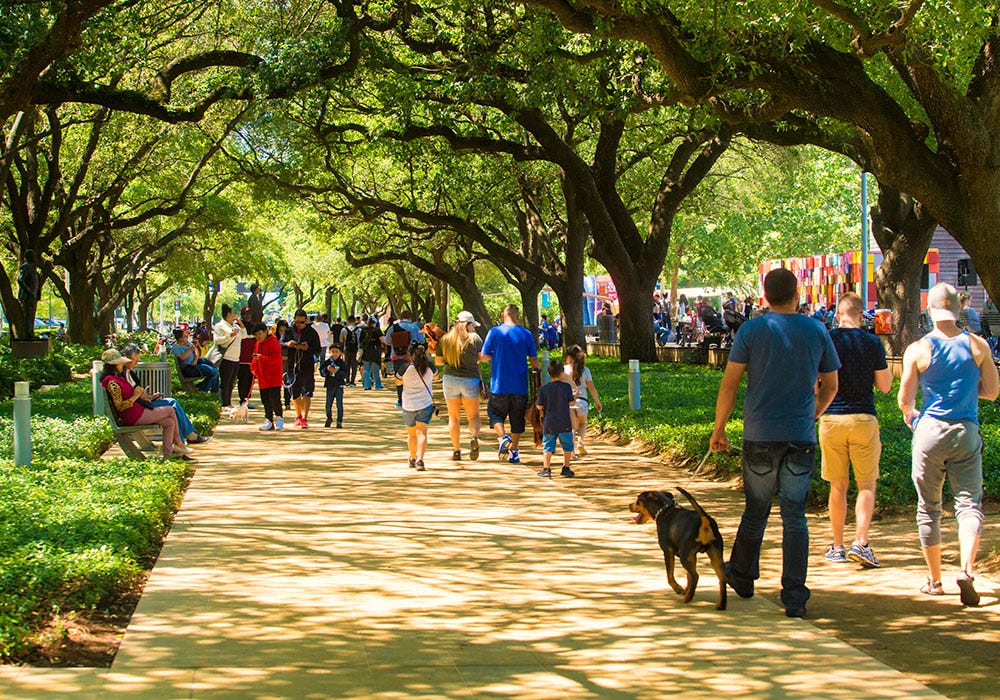Green Spaces or Soft on Crime? You Can't Have Both.
When it comes to predominantly blue cities, "the same instinct that has leftists daydreaming about green spaces also causes them to be soft on crime."
One of President Trump’s most ambitious campaign promises is the restoration of American cities. He frequently laments that our great cities - especially New York City and San Francisco - have become global laughingstocks. Noted more for their crime, filth, and catering to criminals, these cities epitomize the failure of leftist policies. Lizzo, for example, on a Harris campaign stop when she said (before boarding a private jet) that Ms. Harris wants to make all of America like Detroit, was not exactly the ‘win’ that she thought it was.
Meanwhile, a debate regarding what constitutes a great city is ongoing. Is it job opportunities? Should cities consider tax breaks and infrastructure improvements to lure new companies? Do amenities like bike trails make for a great city? Or, is it the green spaces where families can unwind? Perhaps it is universities that bring students and sports tourists to town? The debate comes down to a basic practical vs. aesthetic argument: should cities want more people, or more amenities for the people they already have?
Houston, where I live, seems unique in that it has elements of both. While the city is blue and largely run by leftists at every level, the history of industry is profound and still has a grip on Houston’s way of life. Houstonians work their fingers to the bone in the oil/gas industry, the Medical Center, the Port, research, construction, among others. Houston has been able to grow by attracting industry while it has tried to offer the amenities which modern Americans want: bike paths, green spaces, museums, etc.
However, there is a curious paradox that will ultimately doom these aesthetic projects: the same instinct that has leftists daydreaming about green spaces also causes them to be soft on crime. I don’t know if it is empathy, or utopian idealism, or a naiveté about the nature of crime. But you can’t have soft policing policy and push for more public projects that encourage and allow criminals and the public to commingle. You have to make a choice.
For example, Houston recently unveiled plans for a new market downtown on Main Street. But if the mayor and District Attorney and judges wish to treat criminals like victims and encourage homeless encampments downtown, what person in their right mind would take the families to such a promenade? These public officials end up being forced to speak out of both sides of their mouths.
And yes, one city council member has said to my face that “criminals have rights, too” - which, of course they do - but it’s an idea that translates to, “We can’t take people off the streets and we won’t arrest and prosecute them for public intoxication, trespassing, camping in public areas.” So…we’re all stuck with them, especially in the new public spaces the leftists adore.
What was it that ultimately destroyed the malls? The model remains workable; and it still works in a few places. But the lack of policing and the possibility of unsafe environments was enough to deter families for spending time at the mall. And it was downhill from there.
So cities, you have a choice to make: do you want to spend millions on bike lanes or millions on policing? Do you want safe public places, or green spots littered by the dangerous and drug-addicted? Do you want families to feel safe in the city or do you want to drive them to the suburbs?
Once crime and jobs are taken care of, then officials can install parks, benches, and hundreds of miles of bike lanes for the benefit of the residents. Until then, the dreamland scenarios that leftists imagine need to be killed in the crib. You cannot have promenades, boulevards, parks, and other public venues that are both safe and attractive and also defend a criminal’s rights to commit criminal acts (without recourse) within those spaces. You have to choose one or the other.
Photo Credit: Urban Planning Association





This is a huge issue in my home city as well as our taxes go up to buildup or refurbish run down areas in the city, but they do little or nothing to let them be taken over by homeless encampments or excessive loiterers that just trash the place.
Good point about the malls. Having worked in a couple back in the day, the main concern really does need to be safety. One of them has become festering den for bums and the other still attracts business. The difference comes down to safety, both inside and outside the mall.
I guess the thinking is that if we have more green spaces and bike paths, would-be criminals would mellow out and find other places to loiter and loot or they would take up cycling and birdwatching instead. It never works this way, but it seems like an easy fix so leadership always falls for it.